Meet Giannina.
She is 34 years old and a native of Lima, Peru. She is one of six children, and was named after one of her mother's favorite soap opera characters. She has been married and divorced once, and has a 7-year-old daughter. She only sees this daughter for 2 months out of every year — and no, she's not a criminal or refugee or anything like that.
For the past 10 years, Giannina has been employed on cruise ships.
Currently, she is working as a head waiter on the Carnival Glory, which is where I met her while sailing through New England and the Canadian Maritimes with my family.
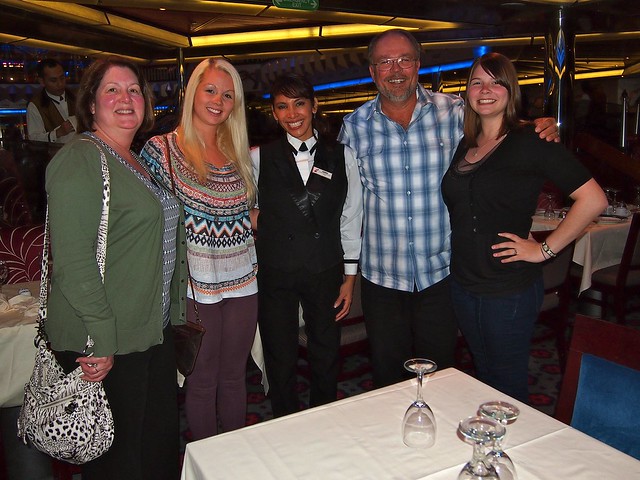
I've been on cruises before, and have struck up conversations with everyone from waiters to room attendants. But Giannina is probably the first cruise employee that I feel like I really got to know, and so I want to share her story. Because her story is the story of the majority of cruise ship employees, and deserves to be told.
I meet Giannina around 8:15 p.m. on June 4, 2012 — my family's first night dining in the Platinum Lounge on the Carnival Glory. We're all gussied up in our fanciest cruise wear, and Giannina greets us with a big, beautiful smile.
“Call me Nina,” she says as she neatly places cloth napkins across our laps and hands us menus with a flourish.
We get to know Nina over the next few days. She tells us about her mother and daughter back home in Peru. She tells us about her Bulgarian boyfriend, who also works aboard the ship. She tells us Alaska is her favorite place she's ever cruised to. And she tells us about what it's really like to work aboard a cruise ship when you aren't a Westerner with white skin.
Cruise ship contracts usually last between 6 and 8 months. In between contracts, Nina gets two months off to go home and see her family. Because she holds a Peruvian passport, she must have a flight booked for the exact day her contract expires, and must leave whatever U.S. port she ends up in immediately. No dawdling. No deserting.
Not that she would desert, of course. Even though she's been doing this for 10 years, Nina wants to eventually go back to Peru. Maybe use her skills and saved-up money to open up a restaurant.
“I do want to go home,” she says.
But not everyone does, she admits. There are more than 50 countries represented by the employees just onboard the Glory alone.
“There are people here from countries I didn't even know existed,” Nina jokes.
Many of these countries are poor, third-world countries. And, sometimes, “home” isn't somewhere people want to return to. One night, Nina tells us about a Haitian man who works aboard the ship. She says Carnival avoids hiring people from countries experiencing especially bad political or social turmoil because of the chance of them deserting. This particular man was brought aboard at the beginning of his contract in handcuffs until he handed over his passport to the powers that be on board. When he leaves the ship, he must have an escort at all times — just in case.
My dad is incredulous. “No way,” he says.
Yes, Nina insists. “For some people, they see this job as a way out.”
It certainly gets me thinking. Especially when Nina shares her salary with us.
Along with receiving free room and board on the ship, Nina and most of her crewmates are paid $75 per month. Seventy-five dollars. That's it. They rely on gratuities and tips for the rest of their wage.
Carnival automatically charges guests a gratuity — an amount that gives a head waiter like Nina perhaps $2 per day per guest that she serves. Pennies in my mind. And some cruise lines don't even charge this mandatory gratuity — in many cases, employees like Nina are at the mercy of the passengers that they serve.
I am rather appalled by this. Having worked in a restaurant before, I know how stingy people can be when it comes to tipping.
But Nina assures us that she makes a good living working aboard ships like the Glory. She takes care of her mother and daughter back home, and is helping to put her brother through school. She also makes enough extra to set aside to work towards that restaurant dream of hers and cover other expenses.
Carnival — like many cruise lines — registers most of its ships in Panama in order to get around U.S. taxes and labor laws. On the one hand, this is beneficial for someone like Nina, since none of her earnings are taxed. But on the other hand, this means she must pay for her own healthcare and other expenses, such as flying home at the end of her contract.
We ask Nina how she began working on cruise ships to begin with. She tells us that the major cruise lines recruit from all over the world, and that she simply went to one of their “casting calls.” She tells us it was a bold move for her to leave home for this job.
“I'm kind of like the black sheep of the family,” she says. “Where I'm from, girls aren't supposed to leave home until they're married. But I went to work on a ship, and eventually came home with a 4-months-pregnant belly.”
Nina talks about her daughter often, mentioning how she'd love to take her to Disney World someday. But, even though Nina could easily afford to pay for her family to join her on a cruise, U.S. beuracracy has kept her from doing so. Her mother and daughter have been unable to get visas to come to America.
“They probably think I'm going to desert and that we'll try to stay,” she says matter-of-factly. I'm not sure how to respond, because I know she's right.
Nina has been trying for at least a year to get visas for her mother and daughter. It's a time-consuming, expensive process, and they've already been turned down twice.
“We can try again in a few months, though,” she says, not at all daunted. “When it's meant to happen, it will happen.”
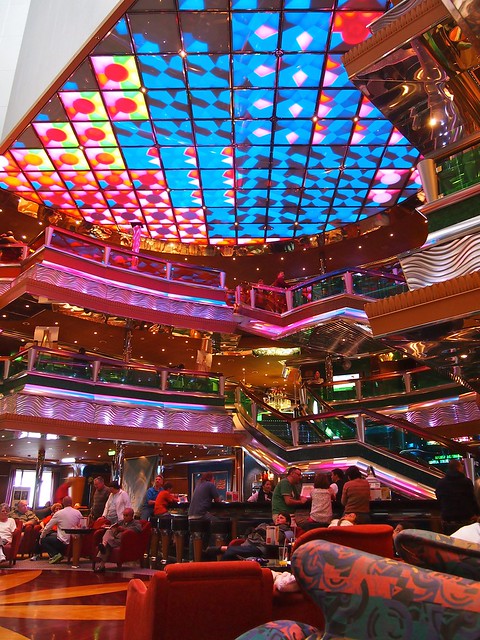
Over the course of a week, my family falls in love with Nina. It's not hard to do, of course. With that big smile and a quick wit about her, you can't help but like her.
I begin trying to put myself in her shoes — in the shoes of someone not quite as lucky and privileged as I am to have grown up in America, with a passport in my pocket that will gain me entry just about anywhere. I feel guilty, almost. I know I have taken this fact for granted in the past.
Nina knows the power of my passport, too. When I tell her I'm working on a master's degree in hospitality and tourism management, she tells me I should come work on a cruise ship.
“You'd get a good job because you're American,” she says. “You'd probably be my boss.”
I don't doubt her, but I also don't feel good about that fact. That, just because of that little blue passport and the address inside it, I'd somehow be more qualified than her, despite her being older and more experienced.
But Nina assures us this is a good job for her, and for many of the crew aboard who come from countries where the U.S. dollar is still very strong. She tells us she makes better money serving cruise ship passengers than she would doing anything back at home.
We ask Nina what she'd be doing now in Peru if she had never made the decision to leave 10 years ago. She doesn't even skip a beat to think about it.
“If I wasn't doing this, I'd probably be married to a chauvinist husband and have six kids,” she said. “I wouldn't have finished school, and I'd probably just be a mommy.”
If given the chance, she says she'd make the same choice again.
Meeting Nina and chatting with her every night in that fancy dining room, knowing she probably makes less in a month than I do during some weeks, made me think about a lot of things.
It made me wonder if I was helping perpetuate an unfair, exploitative system employed by the cruise lines to save a few bucks, or if I was instead helping some of these people feed their families and pursue their dreams. It's a fine line, and I'm still not entirely sure which side I ended up on.
Most of all, though, spending time with Nina made me realize how incredibly lucky I am. Lucky to have been born in the U.S. Lucky to have gotten a good education. Lucky to be able to travel wherever I want, whenever I want.
And lucky to be able to meet people like Nina on my travels.
My dad tells her she should write a book about her life and working on cruise ships.
She laughs and says it would have too many chapters.
What's your take? How do you view huge transnational tourism companies who employ people like Nina for pennies? Are these companies helping or hurting the people they hire?

Amanda Williams is the award-winning blogger behind A Dangerous Business Travel Blog. She has traveled to more than 60 countries on 6 continents from her home base in Ohio, specializing in experiential and thoughtful travel through the US, Europe, and rest of the world. Amanda only shares tips based on her personal experiences and places she's actually traveled!

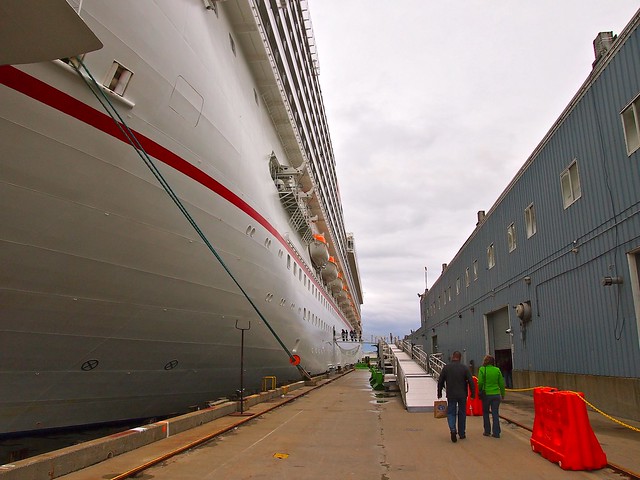
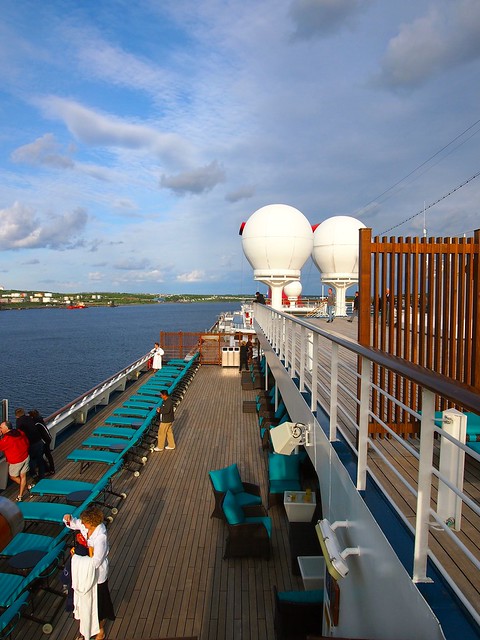
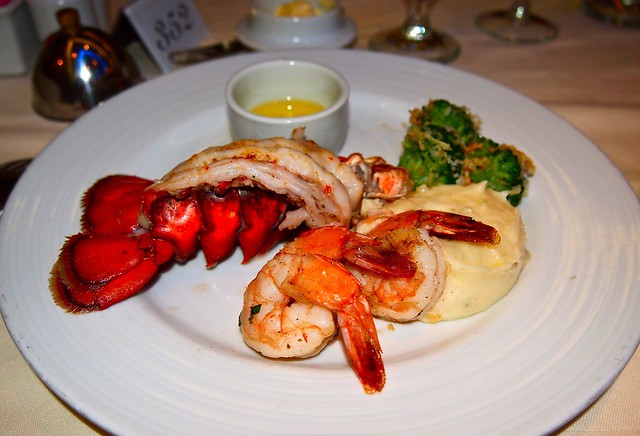









Lighten up everybody! We are not talking about indentured servants here. The cruise companies arrange a 6 or 7 month contract with young people from around the world. They really get the best of the best for a small amount of investment. The employees sign on “with open eyes”….. not Shanghaied, and I believe this job is much better than they could ever acquire in their home county. The companies are involved with a very competitive business. They wouln’t exist if they didn’t show a profit for their investors. This is Capitalism in the purest form. This system makes the World go around and no other system has any civil longevity……so much for economic philosophy. As for the question of why do the cruise companies recruit from so many countries (40+) ? Could it be because the company wants to be seen as an example of a worldwide opportunity employer…… or because the company desires to limit the chance of any employee organized “activity” (read “union formation”)…….you can’t organize if you can’t communicate amongst yourselves.
Do I feel guilty for being a recipient of the emplyees hard work and dedication? Absoutely Not. We paid over $100. US per person for the week for gratuities. This included the “assessed” fee our account was charged and and a little extra for the employees we got to personally know. I still believe a good cruise gives you the best bang for your buck…. but as Giannina says ” that’s another chapter”.
Good points, Dad!
Woah, your dad reads and comments in your blog 😛
My parents have not even read a single one of my blog posts. T__T
The more I hear about Carnival cruise lines, the more I am convinced that I would never, ever take a step on one of their ships. When we were in Honduras we learned about how they were set to dredge 15 km of the Mesoamerican Reef in order to make more room for a new cruise ship dock – because they made a mistake the first time they built it and it wasn’t big enough. Horrifying.
Unfortunately, I don’t think these sorts of practices are confined to Carnival…
Wow. Thank you for writing this — I Had no clue. Especially about the Haitian man in handcuffs. I both abhor it and understand it.
We thought Nina was joking about the handcuffs… but she was totally serious. Crazy stuff, isn’t it?
I loved this post! She sounds like such an incredible and special person.
She definitely is. I’m really glad we got to know her.
I don’t think there will be any cruise company or any tour company for that matter (that is as huge as a cruise ship) that hires all western staff, that would just cost A LOT, and apart from the few that commented here, add a few more 100, none would want to pay the extra money just to know that the staff that will be on their cruise is fairly treated and so…they would rather save the money…
But $75 is just nothing! I do believe that they would be making a lot more through tips though, other wise, a job in Egypt would pay more. Or not. I sadly know that there are people in Egypt that get paid as little as EGP 350 per month (that is slightly less than 60-70 USD) and no tipping!
Its a vicious cycle, and it just cannot end! For it to end, you need a world make over where all countries (and thus all citizens of all countries) are equal and adequately paid, which even a very optimistic person knows it can’t happen, not in our life time at least 🙂
Yup, you are so right that it would take a massive overhaul of society to get rid of stuff like this.
And I DO think these cruise ship employees make a decent amount of tips. Though, by Western standards, I’m sure they still don’t make very much at all!
Just FYI, there are ships that hire all western staff in the US and in Europe. NCL has at least 1 ship in Hawaii that is almost all American crew. The ship doesn’t call on any international ports so all the staff has to be US citizens (or have legal rights to work in the US). It’s much harder for the cruise lines to make money, not just because of the hiring of staff, but because they are required to comply with labor laws (working time, hours, health insurance, etc).
I worked for 2 years as a photographer (I’m American) and my husband (a South African) worked as a casino host. Our jobs were far from the worst, but we didn’t get the perks of management either. We made far below minimum wage and worked ridiculous hours. But, I don’t regret it. It was an amazing experience for the friends we met and the places we traveled to.
Thanks for the post. More people need to know about these conditions. Then maybe less will argue over the mandatory gratuities included in their bills. (yes, people do that!)
That’s interesting about the ships with all-American crews.
And yes, I was just telling my dad the other day that I’m sure there were plenty of people on our ship who contested the mandatory gratuities. Which is so sad. If only they understood!
I have to say I am careful these days who I chose to travel based on exploitations of others, I do want to know the staff are fairly treated and compensated, however as Juliann says its likely to be a better option than home.
Which is what makes it such a tough topic. I mean, they are clearly doing better than they would be at home. But it still bothers me.
I’m stunned at her salary, and it makes me wonder if the salary is different depending on where the person is from–which seems incredibly shady. Were there any American waiters?
I was curious about that, too. And no, no Americans on the dining room staff. Most Westerners end up having management positions.
You saw what l saw with Gap Adventures in Antarctica and I WOULD NEVER RECOMMEND THE COMPANY; not just for using the Philipinno’s as their stable work force, but for other concerns l have about the company.
(Just so you know l have told the CEO twice my concerns, so lm not saying anything l haven’t said to their face)
As an American company (Gap Adventures) they used approx 95% of Anglo’s for their expedition crew, and 100% of foreigners from the 3rd world as their work force. Even the Captain and first Officer were from Bulgaria.
While l agree with Giannia’s sentiments that if she didn’t have a job on the cruise ship then her life would be very different if she stayed in her home country.
My room attendant on the Antarctica cruise was also in the same predicament- does she work in the factory at home OR does she work on a cruise ship for 10 months every year and get a better pay?
She too had a 9-year-old son at home and he was being raised by his grandparents.
She got 4-6 hours off on dry land every 10 days and as Ushuaia has limited shops, and the may purpose for the staff is to save money, there is very limited time to herself.
Personally its a life that l could never live.. l don’t like being exploited and that’s what it felt like to me.
Also to add insult to the staff, the Philipinno’s never got to land on Antarctica… because they have to have their own weather proof jackets and of course that’s low on their priority to buy.
So the ship goes to both Antarctica and the Arctic Circle – yet their staff can’t say they’ve ever been there and stood at both ends of the world!
Ethical travel is something that hit me in Seth Africa and Sth America and l now consider who l use as a guide or traveling company.
Great Article!
Many thanks
Ethical travel is so tricky. In fact, depending on how you look at it, there is no such thing.
Great interview. There’s actually a memoir about one American’s experience working aboard the cruise line. It’s very insightful and reiterates everything Nina says. “Cruise Confidential.”
It is hard to know whether you’re exploiting or helping the people these cruise ships employ, though I lean toward the view that they’re helping. Yes, it’s sad that they are not paid as much as Americans would be, but at the same time, I’ve been to enough third world countries to know that this is a better option than they’re likely to find at home. Too often there are no jobs at all.
Yes, I think I would tend to agree with you.
I have never been on a cruise and this article opened my eyes on many things. Sure, cruise companies save their money by hiring employees from third world countries. But, by doing this they lower prices for tourists (for you and me). I do not think that by hiring them they really care about helping them and their families 🙂
$75 per month…. Wow! I have never thought it is so low.
It’s an interesting cycle, isn’t it? Usually we’re just concerned about getting the best deal possible. But until now, I never really thought much about what those “deals” mean for the people on the other side of the equation.
Super post and a great story!
I’ve just returned from my first ever cruising experience, along the Seine River in France, with a mixed European crew – Hungarian, Slovakian, Slovenian, German, Dutch, British and Portuguese. All did a great job and I assumed they were adequately paid for it. I didn’t ask. We tipped generously, but I hope they weren’t depending on that.
My fellow passengers, many of whom were experienced cruisers, talked of ocean cruises staffed by Asian (often Philippino) crews, who may have been trapped in circumstances similar to Giannina’s.
Well done for asking about the situation of those whose service we can easily take for granted.
Nina was very open and offered up most of the information herself. I’m not sure I would have pried if she hadn’t been so friendly! It was definitely interesting to learn about though.
I’ve known a lot of people who worked on cruise ships and they all say it’s a good job, but not what anyone expects. I work at a major hotel and we have employees from all over the world. Many are refugees. When I hear their stories, I’m reminded everyday how lucky I am to be a US citizen.
I think most of us take it for granted just how lucky we are.
We are so lucky and privileged to have been born in the United States. It’s unnerving to think of how different life can be depending on where you’re from. Great storytelling, Amanda!
It’s absolutely crazy how powerful something as simple as a passport or birth certificate can be…
Interesting story! This is something that most people do not think about when they take a cruise or even travel to other countries. A lot of these situations exist because consumers want a good or service at a certain price and the companies will do what they have to do to provide it. The same thing happens with just about everything we buy. Most of our products are produced in other countries that can make them at a lower cost.
Telling their stories is a great way to let people know what the real story is. In some cases they are doing better than if they would have stayed in the country and in some cases they are not.
One of my favorite things about travel is getting to tell stories like these. There are so many things that the average person has no clue about when they go on vacation!
Wow…great story! I totally understand how you aren’t sure which side of that fine line you fall on. I have similar feelings when I’ve traveled to third world countries. The fact that you took the time to get to know more about her and tell her story says it all!
Thanks, Nicole! I toyed around with how to approach this subject for a couple days, and finally decided the only way to do it justice was to tell Nina’s story. Glad you liked it!